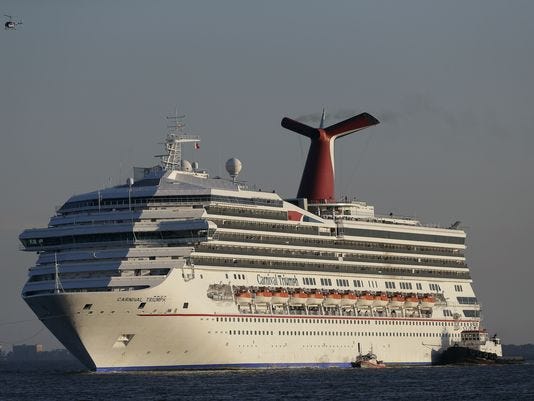 |
| Cruise ship incidents put industry in eye of PR storm: The string of events on Carnival ships in recent weeks once again has the cruise industry fighting for its reputation. In the last week alone, two of Carnival's 24 ships have experienced technical problems that have affected the on-board experience. The widely covered incidents come just a month after an engine-room fire left the 2,758-passenger Carnival Triumph dead in the water in the Gulf of Mexico. |
Hunn's letter is dated March 29 but only became public today. In it, he writes that Carnival Corp. takes incidents such as Carnival Triumph fire "very seriously," noting the company has called in outside experts in the disciplines of fire safety, naval architecture, marine engineering, electrical engineering and mechanical engineering to help with a fleet-wide review following the fire.
The review, announced in March, is focused on the prevention, detection and suppression of fires on Carnival ships; engine room redundancies; emergency power supplies; and other issues, the line has said.
Hunn also disputes a list compiled by Rockefeller's office of 90 serious events on Carnival Corp. ships over a five-year period that was based on reports filed with the U.S. Coast Guard. He says 83 of the 90 events did not meet the definition of a serious marine incident as defined by the Code of Federal Regulations and did not require U.S. Coast Guard intervention.
The remaining seven incidents include the Carnival Triumph fire; another engine room fire on the Carnival Splendor in 2010; the fatal capsizing of the Costa Concordia in 2012; two ship collisions that did not involve injuries to passengers or crew; a case of appendicitis that required the airlifting of a crew member; and an instance of a passenger jumping overboard.
Carnival Corp. is the parent company of both Carnival Cruise Lines and Costa Cruises as well as eight other brands including Princess Cruises, Holland America and Cunard. It carried more than 28 million passengers over the past three years.
"Our commitment to safety is reflected in the significant reviews, corrective measures, redundancies and investments undertaken by Carnival" following such events, Hunn writes.
RELATED: Carnival Triumph passengers describe misery
POLL: Trust in cruise lines down
Hunn notes an industry-wide safety review in response to the Costa Concordia incident that led to changes in safety policies. Carnival also made changes to its operations in the wake of the Carnival Splendor fire, he adds.
Hunn also disputes references Rockefeller made to horrific conditions for passengers on the Carnival Triumph following the engine room fire.
"Much of the information in your letter as to the conditions on board, such as your statements on rotting food and raw sewage, are inaccurate," Hunn writes. "For instance, while the Carnival Triumph was en route to Mobile, Ala., fresh provisions were provided regularly via sister ships or helicopter and served to the passengers."
Hunn adds that there are other inaccuracies in Rockefeller's letter about the Carnival Triumph incident, but "we believe it would better serve all parties to await the official government reports from the Bahamas, U.S. Coast Guard and (National Transportation Safety Board) for an independent and accurate assessment of the ship conditions."
In the written response to Rockefeller's questions, Carnival says the Carnival Triumph fire began after a leak in a flexible fuel return pipe in one of the ship's two engine rooms. It notes such pipes are inspected every six months and replaced at least every 18 months. The pipe had last been replaced on Aug. 23, 2012.
Carnival said there is no evidence that the fire was related to an electrical issue with one of the ship's alternators that occurred in January. Repairs to the alternator were completed on Feb. 2 -- eight days before the fire.
In response to a question from Rockefeller about whether the company would reimburse the government for the cost of the U.S. Coast Guard and U.S. Navy assistance in recent incidents, Carnival suggests the answer is no.
"Carnival's policy is to honor maritime tradition that holds that the duty to render assistance at sea to those in need is a universal obligation of the entire maritime community," the company writes.
Carnival notes that it often renders assistant at sea at its own cost, on its own initiative or at the direct request of the U.S. Coast Guard and other authorities.
In a three paragraph letter that also accompanies Carnival Corp.'s written response, Arison tells Rockefeller that the company is committed to the safety and comfort of its passengers.
"We are proud of our ability to provide millions of people with safe, fun and memorable vacation experiences," he says.
No comments:
Post a Comment